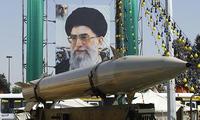-
Weekend nuke talks with Iran run aground

A weekend meeting in Istanbul between Iran and six world powers about the future of Iran’s nuclear weapons program ended in an impasse; Iran insisted that any talks should be preceded by the lifting of the UN sanctions on Iran — but the United States, Russia, China, Britain, France, and Germany were in lock step in their opposition to Iran’s proposed conditions; the group’s unanimity could enhance prospects for a broad international agreement on future sanctions or other punitive measures to force concessions from Iran in the future; the six powers offered Iran a revamped version of last year’s Tehran Research Reactor proposal, in which France and Russia agreed to provide Iran with much-needed fuel rods for a medical research reactor if Iran would part with a large chunk of its stockpile of enriched uranium; such a deal would have left Iran with less than the minimum amount of nuclear fuel needed to make a single atomic bomb
-
-
China's increasing military might causes concern in Asia, West
China’s recent test flight of its first stealth fighter comes as part of a larger military buildup that is concerning its Asian neighbors and the West; the Chinese test of their first fifth generation stealth fighter is years ahead of U.S. intelligence predictions; China is also moving ahead with the construction of its first aircraft carrier as well as other capabilities like a “carrier killing” ballistic missile; in response to China’s stealth fighter test, Taiwan test-fired nineteen missiles; nearly a third of the missiles failed; it is unclear what China’s intentions are though leaders claim these weapons are for self-defense
-
-
U.K. government spent millions on botched spy ring
The U.K. government spends £5 million a year to operate the NPOIU, which monitors domestic environmental and animal rights activists; the NPOIU has been hit with a series of scandals after it was revealed that one of its spies began actively to aid the group he was sent to monitor; the operation led to the failed trial of six activists after the agent offered evidence in their favor; the unit has been stripped of its funding and placed under the command of the Metropolitan Police; the unit was previously run by a private entity
-
-
Khalid Sheikh Mohammed killed Daniel Pearl

U.S. officials used a forensic technique called vein analysis to corroborate the confession of Daniel Pearl’s self-professed killer, Khalid Sheikh Mohammed, who also is suspected of planning the 9/11 attacks on the United States; Mohammed was not part of the original plan to abduct Pearl; he told U.S. investigators that he was pulled in later by another senior al Qaeda operative; Mohammed was asked to take over because the kidnappers — midlevel and low-level Pakistani militants — did not know what to do with Pearl; Mohammed’s involvement presented al Qaeda with an opportunity for what it saw as a propaganda victory; a new report on Pearl’s assassination details problems in bringing to justice others suspected of involvement in the crime, including the recent release by Pakistan of a man thought to have been one of the main players
-
-
South Korean navy recaptures pirated tanker
South Korean special forces team boards a pirate-held tanker in the Arabian Sea; pirates were killed, injured or captured; 21 sailors rescued after being held since last Saturday; three rescuers sustain minor injuries
-
-
Proposals to enhance lawmakers' security questioned
Lawmakers have offered many new measures to protect members of Congress from attempts on their lives; some call for better protection of politicians by local law enforcement; Representative Peter King (R-New York) would make it illegal to carry a firearm within 1,000 feet of a federal official; another proposal is to erect a blast shield around the gallery in the House of Representatives and the Senate; critics of these proposals say that at end of the day, none is going to deter a determined assassin bent on killing a public official
-
-
Hezbollah readies its forces for a Beirut coup

Unarmed, black-clad members of Iran-backed militant group fan out across Lebanon’s capital carrying hand-held radios, Lebanese media reports Hezbollah militants spread across the Lebanese capital of Beirut on Tuesday in a reportedly simulated coup of the capital, in the wake of the political unrest that has engulfed the country since the guerilla movement exited the Lebanese coalition and caused the government to collapse; Lebanon is facing its most severe political crisis in years, after Hezbollah ministers and their cabinet allies resigned from Prime Minister Saad Hariri’s government over disagreements about a United Nations-backed tribunal investigating the murder of his father; the tribunal has apparently indicted several Hezbollah members of involvement in the senior Hariri’s assassination
-
-
Woman wins payout after screener exposed her breasts
U.S. woman was awarded a nominal sum from the government after a TSA pat down exposed her breasts; in May 2008, Lynsie Murley was singled out for an extended search during which agents pulled down her shirt and exposed her breasts; the agents then laughed and joked about the incident
-
-
FDA looks for ways to fund $1.4 billion Food Safety Reform Act
Food-borne illness strikes 40 million Americans, hospitalizing 100,000, and killing thousands each year; on 4 January President Obama signed the long-awaited FDA Food Safety and Modernization Act into law — sweeping legislation that overhauls U.S. food-safety laws for the first time in more than seventy years; the Congressional Budget Office (CBO) estimated the food-safety law would cost about $1.4 billion in its first five years, including the cost of hiring an estimated 2,000 additional food inspectors; the passage of the legislation now presents FDA with the question of how to procure the funding required to implement and enforce the new system
-
-
Australia, U.K. in global terrorism talks
Rising concerns about the emergence of new centers of global terrorism in Somalia and Yemen were a main focus of Monday’s talks between Australian and British foreign and defense ministers; those concerns were leading to increased intelligence co-operation between Britain and Australia; it is understood a new defense co-operation pact between the United Kingdom and Australia will be signed during the summit
-
-
Al Qaeda advocates theft, embezzlement to fund war
Followers of one of the fastest-growing radical Muslim terror groups are being told to steal, embezzle, and seize property -– especially from Americans — in order to finance their jihad; Muslim teaching generally forbids theft, but the new edition of Inspire magazine — launched by the group behind the air cargo printer bombs in October, the underwear bomb plot in December 2009 and the most recent pre-Christmas alert — is now telling followers that such crimes are justifiable, especially if the U.S. government and U.S. citizens are targets; intelligence analysts are also keying in on the magazine’s emphasis on the recruitment of women as suicide bombers; analysts also note that the leading articles in the latest edition of the magazine are all written by Americans.
-
-
New tactics in war on terror -- litigation
Islamic extremists are increasingly using lawsuits to threaten and intimidate civilians across the world; the Danish newspaper Politiken, which published the controversial Danish Mohammed cartoons in 2005, has been hit by a civil lawsuit; a Danish MP was recently forced to plead guilty to hate speech for speaking his mind about Islam; civilians can also use the courts to go after extremists using similar tactics
-
-
Israel, with U.S. help, tested Stuxnet at Dimona before attacking Iran
The New York Times quoted intelligence and military experts to say that U.S. and Israeli intelligence services collaborated to develop a destructive computer worm to sabotage Iran’s efforts to make a nuclear bomb; the Stuxnet computer worm shut down a fifth of Iran’s nuclear centrifuges in November and helped delay its ability to make its first nuclear weapons; before using Stuxnet to attack Iran’s nuclear program, Israel has tested the effectiveness of the malware at the heavily guarded Dimona complex in the Negev desert which houses Israel’s undeclared — and the Middle East’s sole — nuclear weapons program
-
-
UN indicts Hezbollah chiefs in Hariri assassination
Prosecutor for international tribunal investigating assassination of former Prime Minister Hariri files indictment with pre-trial judge; Nasrallah threatens to “cut off the hands” of anyone attempting arrest of Hezbollah members; turmoil grows following last week’s collapse of government
-
-
Invisible tanks to be deployed within five years
British military scientists plan to develop an army of “invisible” tanks ready for use on the battlefield within five years. Armored vehicles will use a new technology known as “e-camouflage” which deploys a form electronic ink to render a vehicle invisible; highly sophisticated electronic sensors attached to the tank’s hull will project images of the surrounding environment back onto the outside of the vehicle enabling it to merge into the landscape and evade attack
-
More headlines
The long view
Factories First: Winning the Drone War Before It Starts
Wars are won by factories before they are won on the battlefield,Martin C. Feldmann writes, noting that the United States lacks the manufacturing depth for the coming drone age. Rectifying this situation “will take far more than procurement tweaks,” Feldmann writes. “It demands a national-level, wartime-scale industrial mobilization.”
No Nation Is an Island: The Dangers of Modern U.S. Isolationism
The resurgence of isolationist sentiment in American politics is understandable but misguided. While the desire to refocus on domestic renewal is justified, retreating from the world will not bring the security, prosperity, or sovereignty that its proponents promise. On the contrary, it invites instability, diminishes U.S. influence, and erodes the democratic order the U.S. helped forge.
Fragmented by Design: USAID’s Dismantling and the Future of American Foreign Aid
The Trump administration launched an aggressive restructuring of U.S. foreign aid, effectively dismantling the United States Agency for International Development (USAID). The humanitarian and geopolitical fallout of the demise of USAID includes shuttered clinics, destroyed food aid, and China’s growing influence in the global south. This new era of American soft power will determine how, and whether, the U.S. continues to lead in global development.
Water Wars: A Historic Agreement Between Mexico and US Is Ramping Up Border Tension
As climate change drives rising temperatures and changes in rainfall, Mexico and the US are in the middle of a conflict over water, putting an additional strain on their relationship. Partly due to constant droughts, Mexico has struggled to maintain its water deliveries for much of the last 25 years, deliveries to which it is obligated by a 1944 water-sharing agreement between the two countries.
How Disastrous Was the Trump-Putin Meeting?
In Alaska, Trump got played by Putin. Therefore, Steven Pifer writes, the European leaders and Zelensky have to “diplomatically offer suggestions to walk Trump back from a position that he does not appear to understand would be bad for Ukraine, bad for Europe, and bad for American interests. And they have to do so without setting off an explosion that could disrupt U.S.-Ukrainian and U.S.-European relations—all to the delight of Putin and the Kremlin.”
How Male Grievance Fuels Radicalization and Extremist Violence
Social extremism is evolving in reach and form. While traditional racial supremacy ideologies remain, contemporary movements are now often fueled by something more personal and emotionally resonant: male grievance.
